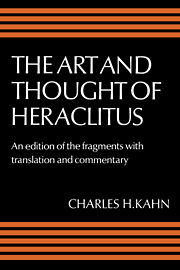 The Art and Thought of Heraclitus
The Art and Thought of Heraclitus Book contents
- Frontmatter
- Contents
- Preface
- Dedication
- Bibliography and abbreviations
- General introduction
- Introductory note to text and translation
- The fragments
- On reading Heraclitus
- Commentary on the fragments
- Appendices
- I Dubious quotations from Heraclitus
- II Doxographic reports
- III Heraclitus and the Orient, apropos of a recent book by M.L. West
- Notes
- Concordances
- Indexes
I - Dubious quotations from Heraclitus
Published online by Cambridge University Press: 26 February 2010
- Frontmatter
- Contents
- Preface
- Dedication
- Bibliography and abbreviations
- General introduction
- Introductory note to text and translation
- The fragments
- On reading Heraclitus
- Commentary on the fragments
- Appendices
- I Dubious quotations from Heraclitus
- II Doxographic reports
- III Heraclitus and the Orient, apropos of a recent book by M.L. West
- Notes
- Concordances
- Indexes
Summary
I translate here, for the sake of completeness, the eight fragments listed as genuine by Diels but not included in my own translation and commentary. Reasons for omission differ from case to case. D. 67a and D. 125a seem to me straightforward forgeries, like some of the examples which Diels listed as spurious (D. 126a–139); D. 46 may belong in the same category. On the other hand, there is no reason to doubt the authenticity of the single word listed as D. 122, but also no hint of a sentential context and hence no way to construe it as a meaningful fragment. In the case of the two citations from Iamblichus (D. 68 and 69), the situation is rather similar: we seem to have a term quoted without any reliable indication of the original context. (I have included a comparable quotation from Iamblichus among the fragments proper, D. 70, LVIII, since it fits plausibly into a context provided by other fragments.) Many editors have accepted D. 49a as a genuine quotation, but I can only see it as a thinly disguised paraphrase of the river fragments (L and LI), modelled on the contradictory form of CXVIII (D. 32), and influenced by the thought of XCII (D. 62): we are and are not alive.431 The text of D. 4 is in a class by itself: preserved in Latin by Albertus Magnus in the thirteenth century A.D., with no hint of a Greek source, it seems nonetheless to preserve a Heraclitean kernel; and I have used it with some hesitation in the commentary on LXX LXXII.
- Type
- Chapter
- Information
- The Art and Thought of HeraclitusA New Arrangement and Translation of the Fragments with Literary and Philosophical Commentary, pp. 288 - 289Publisher: Cambridge University PressPrint publication year: 1979


